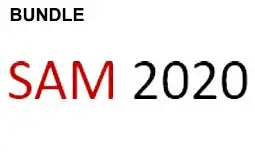Single-Snapshot Beamforming using Fast Iterative Adaptive Techniques
Aboulnasr Hassanien, Elias Aboutanios
-
Members: FreeSPS
IEEE Members: $11.00
Non-members: $15.00Length: 17:27
10 Jun 2020
In this paper, we consider the problem of adaptive beamforming for sample-starved scenarios. A beamforming design method is developed for the case when the only available data is a single-snapshot that is contaminated by the signal-of-interest.
Instead of using the non-invertible rank-one sample covariance matrix, the proposed method reconstructs the interference-plus-noise covariance matrix via estimating the interference signal components and the noise variance. The computationally efficient
fast iterative interpolated beamforming (FIIB) algorithm is used to estimate the spatial frequencies and complex amplitudes associated with the interference. The reconstructed covariance matrix is used for adaptive beamforming design. Unlike existing sparsity-based covariance reconstruction techniques, the proposed method is able to reconstruct off-grid interference components and its performance is shown to not suffer from estimation bias. Simulation examples are used to demonstrate the performance superiority of the proposed method over other adaptive single-snapshot beamforming techniques.
Instead of using the non-invertible rank-one sample covariance matrix, the proposed method reconstructs the interference-plus-noise covariance matrix via estimating the interference signal components and the noise variance. The computationally efficient
fast iterative interpolated beamforming (FIIB) algorithm is used to estimate the spatial frequencies and complex amplitudes associated with the interference. The reconstructed covariance matrix is used for adaptive beamforming design. Unlike existing sparsity-based covariance reconstruction techniques, the proposed method is able to reconstruct off-grid interference components and its performance is shown to not suffer from estimation bias. Simulation examples are used to demonstrate the performance superiority of the proposed method over other adaptive single-snapshot beamforming techniques.



